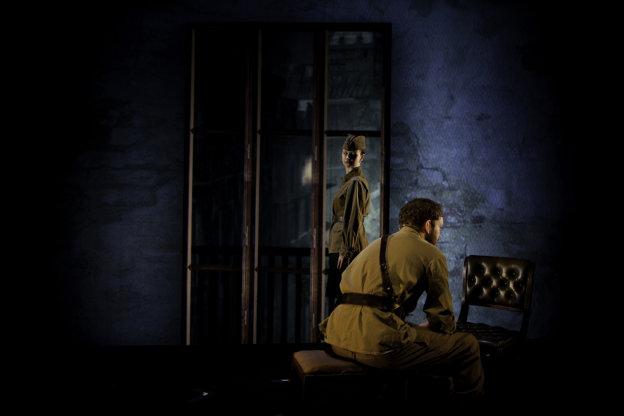In terms of plot, The Zero Hour must surely be Imitating the Dog’s most ambitious production to date. Conceived as the final part of their Harry Kellerman Trilogy (following previous pieces Hotel Methuselah andKellerman), The Zero Hour continues the company’s exploration of the interactions between film (especially cinema), theatre and the construction of narrative. The Zero Hour (or Stunde Null in the original German) was the term used to describe Germany at the very end of World War Two – a ruined and devastated country, confused and demoralised, and at a point where one period of history had ended and another was about to begin. But what exactly constitutes those histories, who decides, and how those histories are to be written, recorded and disseminated – these issues are yet to be decided. It is in this very particular historical moment that Imitating the Dog locate their production – at a point where narratives are about to be constructed and where history as an authorised record and explanation of events is about to emerge.
The Zero Hour deals not simply with World War Two, the choices made by individuals and the ways by which we choose/have chosen to remember and account for the past. By exploring a range of possible outcomes of the war (and mediating these through the work of an onstage contemporary 21st century Chinese film crew making a documentary about it) The Zero Hour provides a lens through which events are viewed, filtered and defined. What it highlights are some of the processes through which history is constructed – and how what emerges through these is never impartial.
The Zero Hour does not attempt to rewrite the history of World War Two, or even offer alternative possibilities for what we think we know about it. Instead, it presents a 90 minute sequence of shots (staged, framed and recorded by the Chinese film crew) that reveals history not so much as ‘what happened’ but as privileged perspective – ‘this is what is happening’ – a series of selected shots that will ultimately provide the definitive accounts of the events they will also come to replace. The Zero Hour makes us aware that alternative readings are (and always were) possible, that the narratives we cling to are not the whole picture – that what has been passed on to us, what we have absorbed through the films we have seen, the books we have read, the stories we have been told, the games we have played, is always partial and incomplete.
Add to this epistemological enquiry a broadcast lecture that intervenes in the production at a number of points (where what would appear to be a Chinese academic gives a detailed account of a train, thousands of carriages long, travelling through time and space) and you have a strangely unsettling eschatological element that infuses The Zero Hour with a sense of hopelessness, even despair. Our desire for fixed meanings and stable narratives is exposed, so we are destabilised and made vulnerable by the suggestion that the intimate relationships between past, present and future are, though keenly felt, unpredictable and elusive.
6 Degrees Below the Horizon (another Imitating the Dog production currently touring the UK) follows a more conventional narrative structure that unravels in more familiar ways. To fully appreciate The Zero Hour (with its unconventional interweaving of and cutting between multiple plots – three of which are different versions, or possible versions, of the same events) demands real concentration and commitment. This is an intense production challenging the audience to watch and listen attentively – the reward, however, is the experience of an utterly engaging, challenging and compelling piece of contemporary performance.


